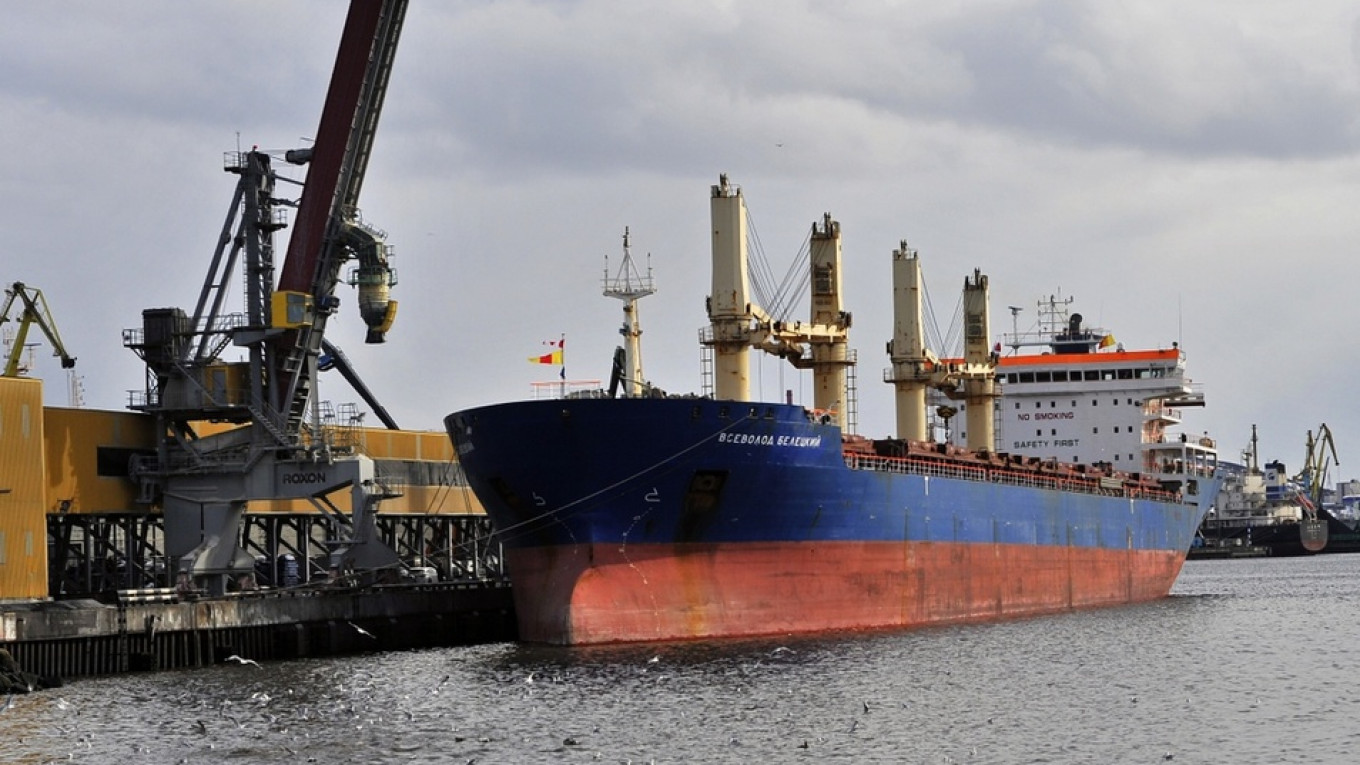Financial turmoil at a major Russian shipping company has left over 150 Russian sailors stranded in port cities across the United States, Europe, Asia and Africa, The Moscow Times has learned.
Since May, the Murmansk Shipping Company, which is 25.5 percent government-owned, has seen at least eight vessels seized by regional authorities for failing to pay for freight costs, according to a Russian labor union.
Meanwhile, more than 150 Russian crew members are effectively stuck in limbo without visas, wages or supplies on board, as they wait for a resolution, according to Sergei Fishov, a spokesperson for the Seafarers Union of Russia.
“Right now, there are around seven to eight ships detained or seized, I don’t know the exact number off the top of my head, some are in a reasonable state, some are in a bad state.”
The topic has largely gone unreported by Russian media. Crew members and relatives contacted by The Moscow Times were reticent to give details for fear of retribution.
Reports in local media in the port cities and accounts given to The Moscow Times by those with knowledge of the situation, however, paint a dire picture.
In an open letter published on the labor union’s website, the crew of the “Viktor Tkachev” vessel, stuck in Abidjan in the Ivory Coast since April, wrote they are “forced to cook their food on a fire” after running low on fuel. They went on to describe the living conditions on board as “atrocious.”
Speaking to the Moscow Times on condition of anonymity over the social network Vkontakte, a mechanic on the “Vsevolod Belezki” ship stranded in Kolkata, India said they felt abandoned.
“Our captain has to plead with his superiors to send us provisions, but they often ignore us. We are running out of food quickly.” He added that he felt he had little choice but to stay on the boat in the hope of eventually being paid five months worth of outstanding wages.
Kristina, the daughter of a crew member stuck in the Spanish town of Ceuta on the north-African coast, painted a similar picture. “Their provisions have practically run out. They have no fruit or vegetables left,” she told The Moscow Times in a phone conversation.
“Some days they catch their own fish to eat. They don’t have fresh water to shower with or to do laundry. It’s very grim there.”
Fishov, the labor union spokesperson, said the union is actively trying to help the stranded sailors, but “the situation is complicated as the shipping company isn’t very communicative.”
Global shipping crisis
In comments to The Moscow Times, the Murmansk Shipping Company admitted that it is currently undergoing financial problems, citing industry-wide difficulties since the financial crisis in 2008.
Earlier, Russian media reported that Rosimushchestvo, Russia’s Federal Agency for State Property Management, was unsuccessful in selling its shares in the Murmansk company citing a lack of buyers.
Western sanctions imposed on Russia have further complicated business, the spokesperson said. On its website, the company lists oil and gas giants Rosneft and Gazprom as its business partners, both of which have been sanctioned by the U.S. for Russia’s involvement in Ukraine.
“International sanctions on Russia have a big impact on our company. Many of our Russian clients are unable to trade with the West anymore,” the spokesperson said.
The Investigative Committee on Tuesday said in an online statement it had opened a criminal investigation into what it said was the Murmansk Shipping Company’s debt of 8.7 million rubles ($132,700) to its employees.
A good news story
In the Dutch city of Terneuzen close to the border of Belgium, where 21 crew members of the “Kuzma Minin” have been stuck since May, the sailors’ plight has become a big local story as the community rallies to help them.
Femke Key, one of the organizers of a local crowdfunding initiative to raise funds for the crew, said she had been overwhelmed by the support.
“Many of the locals here have a bond with the sea, some worked on boats themselves or are avid sailors,” she told the Moscow Times. “They felt some sort of connection with the poor sailors.”
Key, who said she had visited the ship twice to distribute basic provisions like toothpaste, razors and food to the sailors, said that at first the crew had been hesitant to accept the aid, but that they eventually gave in.
“You can see they are proud people and felt ashamed by this situation,” she said.
“But they literally had no food or water left.”

Key says that while most of the sailors have kept to themselves and rarely leave the ship, she has developed an amicable relationship with one of the crew members, who can frequently be seen cycling around town.
He complained to her that they had “no one to talk to about their problems and frustrations with the situation,” she said.
Gijs Mol, a member of the International Transport Workers Federation (ITF) who inspected the “Kuzma Minin,” echoed her assessment, saying that, prior to the fundraiser, the ship’s supplies had reached “critical levels.”
“All they ate for months was potato soup,” he added.
The Murmansk Shipping Company in a statement posted on its Vkontakte page on Wednesday, however, painted a much rosier picture.
“The captain onboard the Kuzma Minin said that the ship was equipped with all the necessities….We believe that the ITF wants to discredit the reputation of the company,” the statement said.
For now, the fate of the 150 sailors remains unclear. While some, like those in the Netherlands, do not have the required visas to venture beyond their port, others have taken up sightseeing.
Nikolai Tilichko who is stranded in the Chinese town Shanhaiguan, estimates that they could stay there till until the end of the year. In the meantime, he has been visiting local attractions and posting pictures online.
“Right now we just don’t know where this is going,” he told The Moscow Times in messages on Vkontakte. “We are just trying to enjoy China as much as we can.”
A Message from The Moscow Times:
Dear readers,
We are facing unprecedented challenges. Russia's Prosecutor General's Office has designated The Moscow Times as an "undesirable" organization, criminalizing our work and putting our staff at risk of prosecution. This follows our earlier unjust labeling as a "foreign agent."
These actions are direct attempts to silence independent journalism in Russia. The authorities claim our work "discredits the decisions of the Russian leadership." We see things differently: we strive to provide accurate, unbiased reporting on Russia.
We, the journalists of The Moscow Times, refuse to be silenced. But to continue our work, we need your help.
Your support, no matter how small, makes a world of difference. If you can, please support us monthly starting from just $2. It's quick to set up, and every contribution makes a significant impact.
By supporting The Moscow Times, you're defending open, independent journalism in the face of repression. Thank you for standing with us.
Remind me later.







